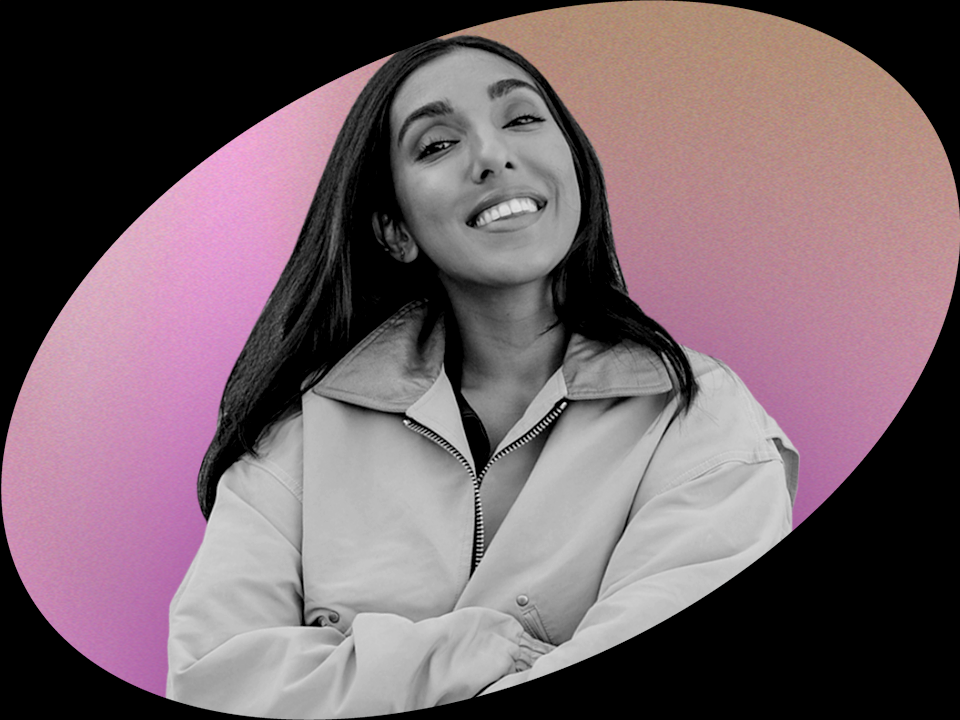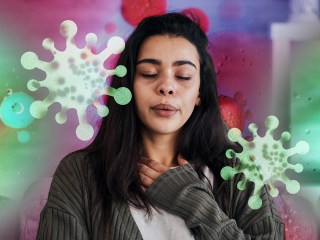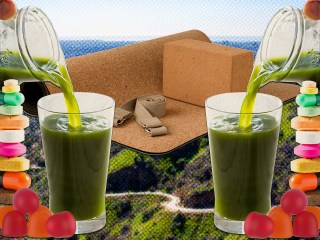Rupi Kaur on Navigating Depression and Finally Feeling Joy
“I often wake up and I feel like a failure.”
You’ve no doubt seen (and probably shared) Rupi Kaur’s deeply relatable poems on Instagram and in her best-selling books. And if you haven’t, we’re honestly a little jealous that you get to experience her words for the first time.
Right before Kaur hit the road and the stage for her 2022 world tour, we were lucky enough to chat with her about the mental health journey she’s been navigating behind the scenes ever since her first book of poetry, milk and honey, made waves in 2014. Here’s what she had to say about that wild ride, the unexpected insecurities, and the advice she would give to her younger self.
[This interview originally appeared in an April 2022 edition of the Wondermind Newsletter. Sign up here to never miss these candid conversations.]
WM: How are you doing lately?
RK: I am feeling better than I have felt in the last couple of days. I go on tour in a month and I forgot what it was like to prepare for it, because we’ve all just been sitting at home. There’s been difficult parts about sitting at home, but I’ve really enjoyed the slowness of it because I think I really needed it. Going into it all, at the start of the pandemic, I was not at the peak of my depression—I was like a year into getting better—but if that slowness hadn’t come, I don’t know if I could have gotten better.
WM: What did that feel like for you: experiencing depression while also in the midst of huge success in your career?
RK: There were years where I was performing, smiling, posting happy pictures of myself in fancy dresses on the ‘gram, but inside the only thing that brought me comfort was the idea of: I just want to sleep forever. I just never want to wake up. That was the only thought that brought comfort. And after a year or two of having that thought consistently, every single day, multiple times, I was like, I don’t think that’s normal, and maybe I should do something about this.
When you’re feeling that low, every part of you, to its very core, tells you you will never, ever, ever feel better. And it’s hard to disagree with that gut because I’m somebody who trusts her gut very much. Because of my gut, I followed my dreams, I wrote poetry, I got on that stage. So when that same voice is telling me that I’m going to be depressed forever and never be happy again, shouldn’t I trust it? I had to realize through therapy and reading and learning that that’s kind of what depression does. It’s this manipulator, and it just makes you think that its voice is your voice.
The journey of getting better wasn’t short or easy, it’s a lifelong process. I’m doing much better now, but I’ve realized that doesn’t mean I’m free to go and not do things like the self-care and the upkeep. But I get excited now to talk about it because I’m not just doing the smiling thing and feeling like, I’m going to fake-it-til-I-make-it my way to happiness. Truly putting that time in, after a couple of years, I’ve been seeing progress, and I do finally feel joy again. I feel things, and that’s really nice. Now I think my next challenge is how to hold onto that when I go on the road.
WM: What aspects of your mental health still feel like a work in progress?
RK: I would say that I still am working on learning how to be more present. I love working so much, but I’m definitely trying to be like: Work is not my whole life. And in those moments when I’m not working, teaching myself to be okay with it.
And with depression and anxiety, it’s such a journey. You kind of never know when it’s going to come back, and that’s really scary. Meditation was helping for a very long time, and then I stopped doing it. And now, I’m like, I gotta start that thing again because I can feel the anxiety. That practice will always be a work in progress. But you know what helps is that I’ve totally stopped giving a shit about thinking that I need to be consistent. To be consistent all the time and to have balance all the time is just not humanly possible, and that’s okay. I’d rather just show up as my confused, anxious self because that feels more whole and more perfect than this other thing that I pretend to be.
WM: What would you say had the most significant impact on your mental wellness?
RK: For me, there wasn’t any one thing. I had to try a combination of things, like exercising a lot, combined with meditation, combined with therapy, combined with seeing my family and friends—and actually seeing them, not just canceling at the last minute—and medication. A lot of things came together.
And what changed is that there was this dissociation that I had that went away. I used to feel, in the midst of the depression, like I was watching my life happen through a fuzzy television screen. I was somewhere else. I was physically here but I wasn’t here. A year and a half into me really working hard at treating this thing (and then slowing the hell down, not going anywhere, just being in one place, one home), one day I stepped into the shower and it was like my mind and body had been apart for so long and then merged together. I could physically feel like, Oh shit, my soul is back in my body, let’s go, let’s do this.
I just had so much dissociation just to make it through being on the move. When that changed, I was jumping for joy and like, This is so cool, I feel like a human being who is doing well! It’s been a goal to keep it that way. I know what helps me is being more slow—and that’s so hard in a world that expects you to move so quickly.
WM: What fears or insecurities might surprise your fans and followers?
RK: I often wake up and I feel like a failure. It might not match up with what externally my life looks like. Or I feel insecure about how I look and I'm like, I don’t want to get up on stage looking like this. Let me just go change everything. One of the biggest things, and I write a lot about it in Home Body, is that I feel like I’m going to be left behind. That I’m irrelevant—that comes up a lot. That is one I probably struggle with the most. I think a lot of people do. We live in a world that discards women. So I cannot get my relevancy from the outside, it has to come from somewhere else. That’s definitely something I’m feeling a lot.
WM: What advice would you go back and give yourself if you could?
RK: I’d be like: You have no idea what the f*ck is gonna happen to you. It’s gonna be horrible, and great, and horrible. I would say… Go to therapy sooner. Start medication sooner. Before I definitely was like, “All natural! No, I’m not going to take anything that could f*ck up my brain. I want to be creative! I don’t want something to numb me.” But I think a lot of these things can be myths. And some of us need it. I was so embarrassed to admit it. I didn’t tell anyone in my family I was on medication because they would freak out (not that anybody needs to know what I do). Some of us need that extra little boost just to get to whatever normal is. I would tell her that it would’ve saved her years of grief if she just tried it sooner. And to just try to enjoy what you have while you have it.
This interview has been edited and condensed for length and clarity.
Wondermind does not provide medical advice, diagnosis, or treatment. Any information published on this website or by this brand is not intended as a replacement for medical advice. Always consult a qualified health or mental health professional with any questions or concerns about your mental health.




